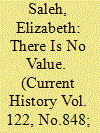| Srl | Item |
| 1 |
ID:
178753


|
|
|
|
|
| Summary/Abstract |
Between 1978 and 2018 the percentage of the Chinese workforce in the service sector rose from 12.2 to 46.3. A large share of this workforce is in sales, selling products ranging from household goods, insurance, advertising space, and education, to various other services. The proliferation of salespeople in China is facilitated by the dramatic increase in the number of university graduates. Personnel in sales jobs, which are particularly popular among graduates from rural backgrounds with degrees from universities with indifferent reputations, experience an extraordinarily high level of mobility. They typically change jobs every few months, either because they are fired or they pursue better opportunities. Based on one year of fieldwork undertaken between 2015 and 2017, this article shows how the rapid expansion of China’s higher education subjects students from rural backgrounds to new inequalities, which, in turn, reconfigure the rural-urban divide into multiple intersecting hierarchies. Building on the concept of complexed development, this article analyzes how salespeople experience contradictory mobilities in a web of intersecting hierarchies. It shows how they achieve upward status mobility by breaking away from agricultural and manual labour and becoming university graduates and white-collar workers; but also, how they sometimes experience downward mobility in terms of income in comparison to previous generations of migrants and their less-educated peers.
|
|
|
|
|
|
|
|
|
|
|
|
|
|
|
|
| 2 |
ID:
193473


|
|
|
|
|
| Summary/Abstract |
This article draws on narratives from middle-class households in Beirut to examine their disenfranchisement amid the country’s financial collapse. A common expression, “There is no value,” is often used in allusion to extreme price fluctuation that has punctuated everyday life since the end of 2019. The phrase also speaks to the undoing of a middle-class lifestyle that emerged with the pegging of the Lebanese lira to the US dollar in the 1990s. Reflecting on how value is conceptualized at the level of the everyday leads into exploring some of the complex ways in which this middle-class milieu accessed credit following Lebanon’s civil war, and how everything has changed during the current dollar shortage.
|
|
|
|
|
|
|
|
|
|
|
|
|
|
|
|